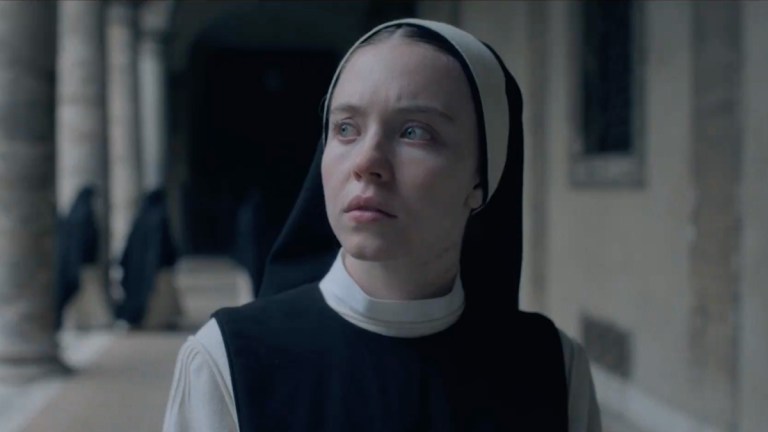Immaculate Review: Holy Hell, Sydney Sweeney
Sydney Sweeney plays a nun pushed to her berserker limit in the Gothic and gonzo Immaculate. And here the devils are real.

It is not original to observe that despite being about salvation, much of traditional Roman Catholicism seems rooted in pain and agony. Like many children before me, I recall vividly the first shudder that accompanied seeing an idol of Christ graphically bleeding on the cross; and when fundamentalist filmmaker Mel Gibson made his movie about Jesus, it was entirely fixated on the passion (read: torture) this messiah endured. The actual resurrection and salvation, meanwhile, was not even deigned a footnote.
Folks should believe what they want to believe—and there are many beliefs, indeed, in a religion with 1.4 billion souls amongst its ranks—but there remains something positively medieval in certain, powerful corners of the orthodoxy. And director Michael Mohan and star/producer Sydney Sweeney have tapped into that iconography to summon a horror full of mysticism, passion, and, of course, pain. As the mother superior in Immaculate intones, “Suffering is love.” In which case, the amorés that await in this happy blasphemy will be legion for the most easily offended.
Playing like a defiant apostate’s screed against the Church (or at least its adherents on the Supreme Court), Immaculate is a parable about what it would mean if an apparent immaculate conception occurred in our world today—particularly if the phenomenon took place in the loving arms of a patriarchy which seeks to smother their new virgin mother, a novice nun named Cecilia (Sweeney), in adoration.
This is the poisoned chalice of Christ’s blood awaiting Sister Cecilia when she arrives in rural Italy to take her final vows and become a bride of Christ. Young, blonde, and looking like Sydney Sweeney, she faces intense scrutiny and skepticism before even leaving the airport. The Italian customs officials lament her search for God “is such a waste.” Her new doting priest, the less than paternal Father Sal Tedeschi (Álvaro Morte), commends her decision; other nuns meanwhile stare with scorn and envy. Each wants to control her, yet it is Cardinal Merola (Giorgio Colangeli) who genuinely does after the old man forces her to kiss his ring following her wedding to Christ.
But if this is her new husband’s house, he’s an absentee spouse. Other than some affection from another young nun who is surprisingly cynical about her vows (Benedetta Porcaroli), there is no love here for innocent Cecilia; just suffering and a rusty 2,000-year-old nail that the priests claim was used to penetrate Christ’s hand. These days, though, the patriarchs are more concerned with Cecilia’s lack of penetration—which they get quite frank about in an interrogation upon learning that their newest convert is with child. Eventually they conclude it’s “a miracle” in their eyes, but it brings tears of anything but joy to Cecilia’s. And that’s before she realizes they also are not letting her choose her own doctor, go to the hospital, or even leave the grounds where she’s beginning to notice cloaked figures haunting her steps.
Immaculate is not a subtle movie, but then the cultural moment it is attempting to drive a stake through is anything but discreet. In an age where ancient religions are still used as pretexts to control women’s bodies from inception to the grave in cases of life-endangering pregnancies, Immaculate writes its metaphors in prenatal crimson. It wants to be Rosemary’s Baby for a more secular age, minus the need for devils. Here the Satanists wear white collars as they literally attempt to drag Cecilia to term and what is anticipated to be the Second Coming of the Lord.
As a shy nun in 21st century Italy, Sweeney is about as believable as Sophia Loren as a Puritan in 17th century New England. The film attempts to acknowledge this disharmony by having many characters ponder the incongruity, but I am not certain it succeeds in turning a potential casting sin into a virtue. However, it finds just enough space in its purgatory to reveal why Sweeney so clearly wanted the role. In addition to having worked with director Mohan before on The Voyeurs, Sweeney has a strong ability to convey soul-crushing desperation, as seen in in manic form on Euphoria and in a more grounded and impressive slow-burn context via Tina Satter’s underrated Reality.
With Cecilia, Sweeney finds a heroine who is put through some demonic paces, which makes her eventual final girl attempt to survive reach Nic Cage-ian levels of gonzo fury. Despite the film’s Rosemary flourishes, the thing has more in common with the splatter cinema of Italian Giallo from the 1970s, and the Yuletide third act is a bloody nice showcase for scenery-chewing.
It’s also the closest the film comes to realizing its genre potential. While the allegory at the film’s heart is pointed and devilishly sharp, Mohan’s aesthetic is often too lurid and formulaic to fully reach the elevated place the film aspires to. There are too many ineffective jump scares for this to actually reach the psychological surrealism of Saint Maud, much less Repulsion or its ilk.
However, when the film accepts the gruesome mirthfulness of its energy, and finally lets Sweeney’s freak flag fly as she descends into the catacombs, wielding a holy relic like Jamie Lee Curtis might appropriate a fire ax, Immaculate conceives a good time at the movies. Just don’t go in expecting a revelation beyond how much suffering one nun can take.
Immaculate premiered at the SXSW Film Festival on March 12. It will open in theaters in the U.S. and UK on March 22.

